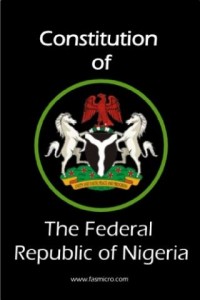Months after the National Assembly set up two committees, one each in the Senate and the House of Representatives, to commence the process of reviewing the 1999 Constitution of the Federal Republic of Nigeria, the review has reached the final stage where the clauses that make up the final copy that shall head to the 36 State Houses of Assembly for concurrence are being voted upon.
In the National Assembly’s quest to produce a ‘Peoples’ Constitution’ that will be acceptable to everyone, public hearings were conducted by the House of Representatives in the 360 federal constituencies, and zonal hearings by the Senate in each of the six geo-political zones. Yours truly was privileged to attend each of the hearings, which inspired the series of articles I wrote on this site from October 2012 where I analyzed the key issues that defined the constitutional debate, such as states creation, state police, immunity clause, etc.
At this stage where both chambers of the National Assembly have started voting on the proposed clauses, it is necessary for us to do a stock-taking and ask if the new constitution being proposed so far is reflective of the views of Nigerians.
While the House of Representatives voted wisely, in my opinion, not to approve the creation of any state out of the 72 state creation requests received, it sadly went with the Senate to approve life pension for all the principal officers of the National Assembly. It shows the insensitivity of the legislators to the feelings of Nigerians – while Nigerians have constantly been complaining about the outrageous salaries and allowances they receive, they choose to rub salt in the wound with a life pension for all principal officers.
The National Assembly also unanimously voted to remove the immunity clause shielding the president, vice president, governors and their deputies from civil and criminal prosecution while in office, against what I believe to be better judgement.
On the positive side, they have jointly voted against changing the term limits for the president, governors and their deputies, a wise decision that has prevented us from being on the route to a president-for-life.
The Senate, meanwhile, is still smarting from the reaction of Nigerians not to delete Section 29 (4)d which spells out the criteria under which one can renounce Nigerian citizenship, in a move wrongly construed as legalizing child marriage. It also is yet to vote on local government autonomy, already approved by the lower house.
Sadly, however, the new constitution being produced does not take us anywhere towards a truly federalist nation as I would have desired, save for moving minimum wage to the concurrent list, allowing states to negotiate their own minimum wages. The police force is still the same federally-controlled, highly-centralized one; Nigerians in diaspora are still not allowed to vote and we are yet to solve the indigene/settler dichotomy, despite recent happenings that alerts us to the urgency of solving it.
There is still excessive power at the centre, and the bulk of revenues in the country still go to the federal government, continuing to make the states overly reliant on it, and denying them the incentive to build their own economic bases.
But does it mean that this is the end of reshaping our country into the sort of nation we desire? Not at all!
The work of constitutional review should not be a time-bound one, but should be one that can arise depending on the situation. A clear example can be seen in 2010 after the political impasse created by the illness of late President Umaru Yar’adua, that the National Assembly added Section 171 (4), which spelt out the maximum amount of time the president or a governor could be away from office without a written directive that his deputy act in his stead.
It also means that Nigerians must be awake and demand for what they want, exerting pressure on their legislators through the media, protest movements and continuous engagement through every means. It is sad that many Nigerians ignored or were ignorant of a constitutional review exercise until the #ChildNotBride issue, which sadly, has seemed to have died down.
As time goes on, political events would occur that would necessitate the reviewing of certain sections of the constitution. We just hope that at those junctures, our legislators shall not shy away from what is expected of them.
Constitutional development, like democracies, are not destinations, but journeys.

